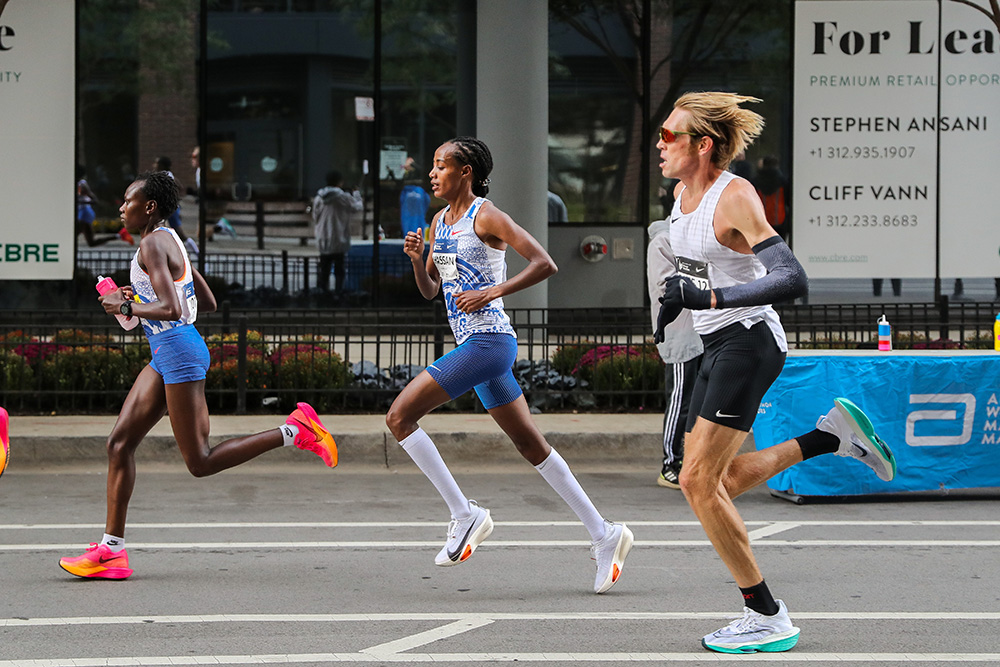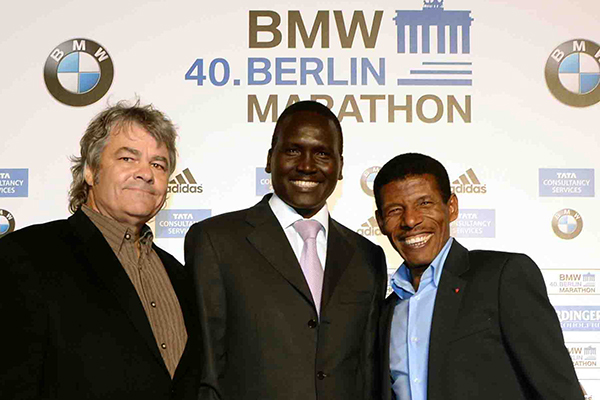
CHICAGO, ILLINOIS, October 08 — As one of the most accomplished track athletes ever to take to the oval, be it for 2 or 25 laps, Sifan Hassan has a problem, a marathon problem. She has said, “I know I am supposed to focus on track, but ever since running London, my brain, it just leaps to the marathon, I can’t do anything about it.”
The 30-year-old Hassan came to Chicago looking for answers, and after some 2:13:44 of marathon drama that included a rollicking start, midrace misadventure, and a agony in the finishing stretch, Hassan left town with the second-fastest women’s clocking in history, and maybe an even bigger problem.
Hassan’s biggest on-course challenge was chasing down fast-starting Ruth Chepngetich as the two-time defending Chicago champ ran at World Record pace through 25K, and would finish in 2nd in 2:15:37, equal to the No. 7 all-time performance put up by Tigst Assefa in her first Berlin win last year.
Ethiopian Alemu Megertu finished 3rd in 2:17:09 and moved to No. 11 performer all-time. Kenyan Joyciline Jepkosgei crossed 4th in 2:17:23.
Three US runners finished in the top 10, led by ’22 Chicago runnerup Emily Sisson, 7th in 2:22:09. Olympic bronze medalist Molly Seidel returned to form placing 8th in a PR 2:23:07, and Sara Vaughn finished 10th in 2:23:24, also a career best. (Continued below)
Hassan’s hopes for a race without the drama of her London debut were dashed when Chepngetich sped away from the start in a hurry. The diminutive Kenyan had a big impact on this race right from the gun, opining later that “it was a good day to chase a high pace.”
Chepngetich zipped through the opening 5K in 15:42, 2:12:30 pace, well off her bombastic 15:11 start last year, but fast enough that Hassan spent the opening kilometers just trying to catch the lead group.
“I think Ruth is amazing, and I have a big respect for her,” Hassan said. “She went right off from me, and was far away at first and I couldn’t catch up. The first 3K I was feeling like I was running 1500 meters because I was really freezing.” Worse yet, she added, “I’m no morning person.”
After Hassan finally made her way up to the lead group, Chepngetich surged ahead even faster, covering the second 5K in 15:23 to reach 10K in 31:05, a robust 2:11:09 pace. The high pace continued with a third 5K in 15:32, reaching 15K in 46:37 (2:11:08 pace), and a subsequent 15:39 5K sent the lead duo past 20K in 1:02:16 — on 2:11:22 pace.
Hassan struggled to find a comfortable rhythm: “In the first 15 kilometers we went so hard I was really suffering because I felt like I was sprinting, just pushing really hard and I feel pain and I thought no way am I going to win.”
Hassan fell 6 seconds behind Chepngetich who crossed halfway in 65:42. “The high pace was not a problem,” Chepngetich said, “but it was not consistent, it was up and down.”
Hassan’s race took a turn for the better as her pacer Reid Buchanan eased her back to the front and she shifted into racing mode. “At 22K Ruth was ahead and I was trying to catch her,” she said. “Then at 25K I was pushing hard to try to get rid of Ruth,. Our kilometers were up and down because we were sprinting and trying to get rid of each other.”
Hassan seemed to finally hit her regal stride after 25K, clipping off a string of sub-3:10 Ks and dropping Chepngetich in the 26th kilometer. The defending champ admitted, “It was a little bit windy and I think that is where I lose my running rhythm.”
Cruising along at 2:11:57 pace at 29K, Sifan’s midrace misadventure came when she had to backtrack some 20m to grab her fluids at 30K: “That problem with the bottle was very tough. I was so focused, I missed it and had to go back and I think that I lost many seconds.”
It was soon readily apparent that Hassan had also lost her rhythm and would learn a lot about surviving a fast-paced marathon over her final 12K.
Fortunately, the stride mechanics that serve her so well on the track, allowed her to manage 16:17 and 16:19 5K segments between 30 and 40K, even as all systems were shutting down.
“It was so chilly I was biting my lips and at the end there is wind and I was by own,” she said. “I was feeling that I was not moving and I thought that I would run a 4-minute kilometer, and I just want to finish.”
Hassan’s anticlimactic 65:48/67:56 finish only underscores that this 2:13:44 effort was just a glimpse at her marathon potential. That potential was on full display from 22–30K, as she got to racing, powering her long and lean frame down the road and away from a formidable competitor.
With real prospects for running much faster, Hassan’s No. 2 clocking almost seems incidental to her decision to embrace the marathon, and her time is most noteworthy when added to her gaudy PR line of 1:56.81, 3:51.95, 8:18.49, 14:13.42, 29:06.82 and 65:15.
Chepngetich paid a heavy 65:42/69:55 price for pushing the envelope through 25K but held on to record her world leading fourth sub-2:17:30 performance. She recalled, “I just maintained my pace so that I could finish it. I pushed myself up to the last minute and made the podium. With the time I’ve run today, I think I should qualify for the Olympics next year.”
As for Hassan, “I just want to chill out,” she said. “It was so painful in the second half I was thinking I’m not going to ever run a marathon again. So let me recover from this and I will decide what to do.”
While putting off her problem, Hassan reflected on lessons learned: “My brain is still thinking about it but chasing the WR with a crazy start and another competitor is not a good plan. I think for an athlete to run a World Record you have to focus just on time, not any competitors. If it is just me it is simple and you just focus on time.”
Here Sifan paused before adding, “The pacer has to be a 2:08 guy.”
After missing out on London last spring with a hip injury, Sisson returned to the marathon with a solid performance, running close to her AR pace before a stitch sent her to Plan B.
“The beginning was great and I had a nice pack to run with,” Sisson said. “I felt good at halfway (69:31) then in mile 18 I felt a side stitch come on. By mile 21 it was really bad, and the last miles were brutal so I was just happy to gut it out.”
Seidel also produced a notable comeback effort, with her PR coming at an opportune time. “After being gone for about a year and a half I just needed to come out and have a really solid day and get some good momentum going into the Trials,” she said. “I checked all the boxes and came away from it feeling very excited to race again.”
CHICAGO WOMEN’S RESULTS
1. Sifan Hassan (Neth) 2:13:44 NR (2, 2 W) (15:43, 15:22 [31:05], 15:32 [46:37], 15:39 [1:02:16], 15:50 [1:18:06], 15:54 [1:34:00], 16:17 [1:50:17], 16:19 [2:06:36], 7:08) (1:05:48/1:07:56);
2. Ruth Chepngetich (Ken) 2:15:37 (x, =7 W) (1:05:42/1:09:55); 3. Alemu Megertu (Eth) 2:17:09 PR (11, x W);
4. Joyciline Jepkosgei (Ken) 2:17:23 PR; 5. Tadu Teshome (Eth) 2:20:04; 6. Genzebe Dibaba (Eth) 2:21:47; 7. Emily Sisson (US) 2:22:09 (1:09:31/ 1:12:38);
8. Molly Seidel (US) 2:23:07 PR (10, x A) (1:10:47/1:12:20);
9. Rose Harvey (GB) 2:23:21 PR; 10. Sara Vaughn (US) 2:23:24 PR; 11. Gabriella Rooker (US) 2:24:35 PR; 12. Dakotah Lindwurm (US) 2:24:40 PR; 13. Emma Bates (US) 2:25:04; 14. Tristin Van_Ord (US) 2:25:58 PR; 15. Sutume Asefa (Eth) 2:26:49; 16. Dominique Scott_Efurd (SA) 2:27:31 PR; 17. Desiree Linden (US) 2:27:35; 18. Maggie Montoya (US) 2:28:22; 19. Emeline Delanis (Fra) 2:31:29 PR; 20. Stacy Ndiwa (Ken) 2:31:34 PR.
(best-ever mark-for-place: 2–4)

